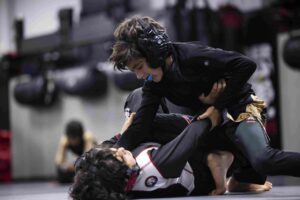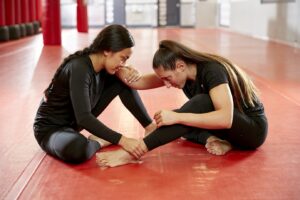Last Updated on September 11, 2024.
So, you’ve decided to take the plunge into the world of Brazilian Jiu-Jitsu (BJJ). Jiu-Jitsu is not only a fantastic workout but also a valuable skill set for self-defense. But like any new adventure, the first step can be daunting. This guide will give you a heads-up on what to expect, so you can walk onto the mat with confidence.
Why Choosing Jiu-Jitsu Classes is a Great Decision
Choosing to take Jiu-Jitsu classes is a fantastic decision for many reasons. Not only will you get a full-body workout that improves strength, flexibility, and endurance, but you’ll also learn practical self-defense skills. Jiu-Jitsu boosts mental discipline and confidence, fostering a sense of community and camaraderie among practitioners. Plus, it’s a lot of fun.
Confidence Builder
One of the most significant benefits of Jiu-Jitsu classes is the confidence it builds. As you progress through your training, you’ll find yourself more comfortable in confrontational situations and more assured in your ability to defend yourself. This newfound confidence extends beyond the mat and into your everyday life, helping you tackle challenges with a stronger mindset. The sense of accomplishment from mastering a technique or achieving a new belt level is unparalleled, reinforcing your self-esteem and determination.
Fitness and Fun
Jiu-Jitsu is a full-body workout that improves strength, flexibility, and endurance. Each session engages multiple muscle groups, providing both aerobic and anaerobic benefits. Unlike traditional gym workouts that can become monotonous, Ju-Jitsu keeps you on your toes with its ever-evolving techniques and strategies. It’s fun and stimulating, ensuring that you stay engaged and motivated. Plus, the camaraderie and support you’ll find in your Jiu-Jitsu community make the journey even more enjoyable.
Stress Relief
In today’s fast-paced world, stress is a common issue for many. Jiu Jitsu offers an excellent outlet for stress relief. The physical exertion and focus required during training sessions help you disconnect from daily worries and immerse yourself in the moment. The endorphins released during exercise also contribute to a feeling of well-being, leaving you more relaxed and centered after each class.
Lifelong Learning
Jiu Jitsu is a martial art that offers endless opportunities for learning and growth. Whether you’re mastering a new technique, refining your existing skills, or strategizing your next move, there’s always something new to discover. This constant learning process keeps your mind sharp and your body agile, providing a fulfilling and intellectually stimulating experience.
Community and Support
The BJJ community is known for its inclusivity and supportiveness. When you start Jiu-Jitsu classes, you become part of a family that encourages each other to grow and succeed. The friendships and connections you build on the mat often extend beyond it, creating a strong support network that enhances your training experience and personal life.
Practical Self-Defense
One of the core reasons people choose to practice Jiu-Jitsu is its effectiveness in real-life self-defense situations. Jiu-Jitsu equips you with the skills to protect yourself and others, teaching you how to control and neutralize threats without relying on brute strength. The emphasis on technique and leverage means that even smaller individuals can defend themselves against larger opponents, making it an ideal self-defense system for everyone.
What to Expect in Your First Jiu-Jitsu Class
Warm-Up and Drills
Your first jiu-jitsu class will kick off with a warm-up to get your body ready for the physical activity ahead. Expect to engage in activities like jogging, jumping jacks, and dynamic stretching to loosen up your muscles and get your blood flowing. The warm-up not only prepares your body but also helps to prevent injuries by ensuring you’re adequately limbered up. After the initial warm-up, you’ll move on to specific drills designed to teach you the foundational movements of Jiu-Jitsu. These might include exercises like shrimping, bridging, and various rolling techniques that are crucial for developing your grappling skills.
Partner Drills and Technique Practice
Once you’re warmed up, you’ll likely pair up with a training partner to practice the techniques demonstrated by your instructor. These partner drills allow you to apply what you’ve learned in a controlled environment. Your instructor will guide you through the steps, offering corrections and tips to help you improve. Don’t worry about sparring on your first day; most schools introduce live rolling gradually, ensuring that you’re comfortable with the basics before diving into more intense practice.
Understanding Positions
In your first class, you’ll be introduced to the basic positions of jiu-jitsu, such as guard, mount, side control, and back control. These positions are the building blocks of Jiu-Jitsu and form the basis of both offensive and defensive strategies. Understanding these positions is crucial as they dictate the flow of grappling and help you maintain control over your opponent.
Learning Basic Submissions and Escapes
Your initial classes will also cover basic submissions like the armbar, triangle choke, and rear-naked choke. Equally important are the escapes from these holds, which teach you how to get out of a bad situation safely. These foundational techniques will form the core of your early training and provide a solid base for more advanced moves as you progress.
Class Structure and Atmosphere
Jiu-Jitsu classes typically follow a structured format, starting with warm-ups, moving into technique instruction, and finishing with partner drills or light sparring for more advanced students. The atmosphere is usually supportive and inclusive, with instructors and fellow students eager to help newcomers learn and grow. You’ll find that the BJJ community is welcoming and encourages mutual respect and cooperation.
Questions and Feedback
Don’t hesitate to ask questions during your first class. Instructors are there to help you understand the techniques and principles of Jiu-Jitsu, and they appreciate it when students show eagerness to learn. Feedback from your instructor is invaluable and will help you correct mistakes and develop good habits from the start.
Post-Class Review
After the class, take a moment to review what you’ve learned. Reflecting on the techniques and drills will help reinforce your memory and improve your understanding. Many martial arts schools encourage students to keep a training journal where they can jot down notes and insights from each class, aiding in their overall progress.
Embracing the Journey
Remember that everyone was a beginner at some point. The key to success in Jiu-Jitsu is consistency and a willingness to learn. Embrace the journey, be patient with yourself, and enjoy the process of becoming proficient in this incredible martial art. Your first class is just the beginning of a rewarding and transformative experience.
What age is the best for a first Jiu-Jitsu class?
Kids Classes
Jiu-Jitsu classes are designed specifically for children ages 5–7 years old, providing a fun and engaging way for young kids to learn the fundamentals of Jiu-Jitsu and self-defense. These classes focus on teaching essential skills such as discipline, focus, and respect. Through playful drills and activities, children build their agility, flexibility, and coordination while thoroughly enjoying themselves.
For older children, ages 8–12, Jiu-Jitsu classes are tailored to build confidence and self-esteem. These classes emphasize teaching kids how to defend themselves effectively without resorting to violence. Our certified instructors guide students through valuable life skills, such as discipline, respect, focus, and goal setting, all through the practice of Jiu-Jitsu. This age group benefits from a more structured approach, helping them develop a strong foundation in both martial arts and personal development.
Teens and Adolescents
Classes designed specifically for teenagers focus on increasing strength, stamina, flexibility, and cardio fitness. These sessions provide a comprehensive workout that enhances physical health and promotes overall well-being. Teens engage in exercises and drills that challenge their bodies, helping them to build muscle, improve endurance, and maintain flexibility.
Jiu-Jitsu also teaches practical self-defense skills tailored for teens of any size or strength. This martial art emphasizes technique and leverage, allowing even smaller individuals to effectively defend themselves against larger opponents. Learning these skills boosts teens’ confidence in their ability to protect themselves, which is invaluable in today’s world.
Beyond physical benefits, Jiu-Jitsu classes foster the development of confidence and a healthy self-image. As teens master new techniques and see their progress, they gain a sense of achievement and self-worth. The supportive and positive environment of a Jiu-Jitsu academy encourages personal growth and helps teens build a strong, healthy self-image.
Character development and social skills training are integral parts of the Jiu-Jitsu experience for teens. Classes emphasize respect, discipline, and teamwork, helping young practitioners develop essential life skills. The positive and encouraging atmosphere allows teens to form meaningful connections with their peers, enhancing their social skills and creating a sense of community.
Adults
Jiu-Jitsu classes for adults offer a dynamic and inclusive way for individuals of all fitness levels to learn the art of Jiu-Jitsu and self-defense. These classes are designed to accommodate beginners as well as seasoned practitioners, focusing on developing essential skills such as discipline, perseverance, and mental fortitude. Through structured drills and practical techniques, adults enhance their physical fitness, including strength, flexibility, and cardiovascular health, all while engaging in an enjoyable and social environment.
For those looking to improve their overall well-being, Jiu-Jitsu classes for adults provide significant mental and emotional benefits. It fosters stress relief, boosts confidence, and promotes a sense of community and camaraderie among practitioners. Certified instructors guide students through progressive training, emphasizing the importance of technique and strategy over brute strength. This approach ensures that everyone, regardless of their physical condition, can successfully learn and apply Jiu-Jitsu techniques, gaining both self-defense skills and valuable life lessons such as patience, resilience, and respect for others.
Conclusion
If you’re ready to begin an inspiring journey and experience the multitude of benefits that Jiu-Jitsu offers, there’s no better place to start than Tiger Schulmann’s Martial Arts. Our beginner-friendly classes are designed to welcome you with open arms, providing expert instruction and a supportive community to help you succeed from day one. Whether your goal is to get in shape, learn self-defense, or simply try something new, our certified instructors will guide you every step of the way. Don’t wait any longer—join us at Tiger Schulmann’s and discover the transformative power of Jiu-Jitsu. Sign up for your first class today!



